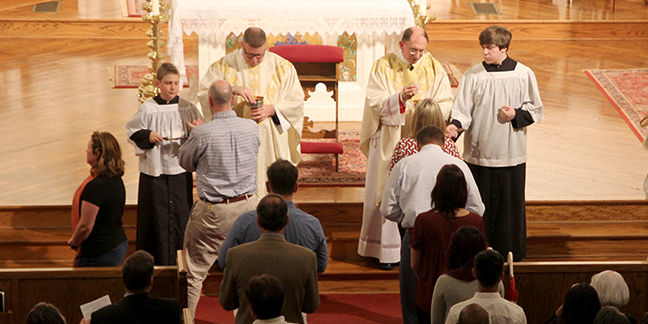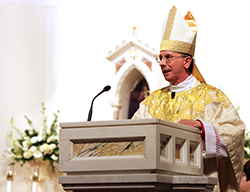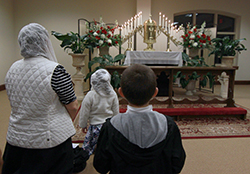 CHARLOTTE — St. Patrick Cathedral was filled to capacity March 29 as Bishop Peter Jugis celebrated the Mass of the Lord’s Supper.
CHARLOTTE — St. Patrick Cathedral was filled to capacity March 29 as Bishop Peter Jugis celebrated the Mass of the Lord’s Supper.
The Mass of the Lord's Supper on Thursday commemorates Jesus' institution of the Eucharist at the Last Supper, His washing the feet of His disciples, His agony in the Garden of Gethsemane, and His betrayal and arrest. The liturgy marked the start of the Triduum, the three holy days preceding the Resurrection of the Lord at Easter.
In his homily, Bishop Jugis reflected on the day’s Gospel reading from John 13:1-15, particularly the statement, “He loved His own in the world and He loved them to the end.”
Jesus’ love, even as He approaches His death, Bishop Jugis noted, “is constant. It does not vacillate; it does not waver at all. It is full and it is undiminished.”
Knowing that He is about to die, Jesus gives His disciples – and us – the ultimate gift of His love: the Eucharist, Bishop Jugis said.
Of course, Jesus shows His love throughout His life, from obedience to His parents in His youth to the working of many miracles and healings during His public ministry, the bishop continued, “but here at the Last Supper is the greatest expression, the most perfect expression of His love for the whole human race.”
“He’s laying down His life. Everything is now on the line.”
The bishop recalled that Jesus had once said, “No one has greater love than this, to lay down one's life for one's friends.” (John 15:13)
Jesus’ coming death on the cross is “the most beautiful and perfect and full expression of His love,” he emphasized.
Bishop Jugis also explained that Jesus institutes the Eucharist at this critical moment before His death, and not earlier in His ministry such as when He multiplied the loaves and fishes. Why? “He chooses now, as He is approaching His death, because the Eucharist is the perpetuation of the sacrifice that He’s about to undergo. The Eucharist is the greatest expression of the love that He wants to show us.
“He chooses now, as He is approaching His death, because the Eucharist is the perpetuation of the sacrifice that He’s about to undergo. The Eucharist is the greatest expression of the love that He wants to show us.
“The Eucharist is the perpetual reminder of His living presence with us, the Real Presence – His Body, Blood, Soul and Divinity.”
There is “no greater memorial that He could possibly leave us about how much He loves us.”
The Eucharist, Bishop Jugis said, is “the great love, the great sacrifice, the ultimate sign of His love, that remains also constant, full, undiminished, even to our own time. He wanted a sign of His love to remain to the end, until the end of the world.”
“That greatest love will remain constant through the institution of the Eucharist.”
Bishop Jugis also recalled the words of St. John Paul II that “the Eucharist is the fruit of Jesus’ death.”
“Out of Jesus’ death springs forth abundant life,” he said. Just as when Jesus said that a grain of wheat has to die to produce fruit, He had to die for the fruit of His salvific grace to be produced.
“That love changes lives. That love changes people,” the bishop continued, because the Eucharist nourishes the faithful, enabling them to share God’s love with others.
The saints and martyrs are prime examples of this fruitful, selfless love, he said.
“That Eucharist, that sacrifice of Christ, His Real Presence continues through the ages to produce abundant life for the Church and for the world,” he said. “How blessed we are to be able to know the meaning of the Last Supper, why Jesus is doing this now, and now to be receiving what He wanted to be perpetuated throughout history, until His Second Coming.” “This is the gift of Jesus, the gift that He gives you,” he said, gesturing to everyone gathered for the Mass.
“This is the gift of Jesus, the gift that He gives you,” he said, gesturing to everyone gathered for the Mass.
“Ask the Lord to make His Eucharist produce in you abundant gifts of holiness, of faith, hope and charity and mercy, and all the other virtues that you especially need to live faithfully,” he concluded.
At the end of the Holy Thursday Mass, altars in every church were stripped bare, candles and lights were extinguished, and the Blessed Sacrament was transferred to a temporary altar of repose until Easter – outwardly demonstrating the sense of the Church's bereavement and loss during the time of Christ's Passion, death and burial.
Catholics then spent time in Eucharistic Adoration, recalling Jesus' words to His sleepy disciples in the Garden of Gethsemane, "Could you not keep watch with Me for one hour?"
On Good Friday, no Mass is celebrated.
— Patricia L. Guilfoyle, editor
See more photos and video highlights from Holy Thursday liturgies
CHARLOTTE — Thanks to a coordinated effort among the Diocese of Charlotte’s Development Office, pastors, parish finance councils and other leaders, four parishes have created “planned giving committees” to encourage people to remember the Church in their wills.
The four “pilot parishes,” serving as an example for other parishes across the diocese, are Christ the King Church in Kings Mountain, Immaculate Conception Church in Hendersonville, St. Ann Church in Charlotte and St. Mary Help of Christians Church in Shelby.
Gayden Gauthier, chair of the finance council at Immaculate Conception Church, organized his parish’s four-person planned giving committee. Gauthier said they are seeing good results from their efforts.
“We had an estate planning workshop last May and 46 people attended,” he said. More than 30 people at the parish are members of the Immaculate Conception Legacy Society, meaning they have indicated that they have earmarked an estate gift for the parish in their will, he said.
As a result of the committee’s outreach, Gauthier said, more people have inquired about joining the parish’s Legacy Society.
“We’re trying to educate and make people more aware of ways they can support the Church and do it more effectively,” he said.
Father Michael Kottar, pastor of St. Mary Church in Shelby, said his parish’s planned giving committee is key to their long-term planning efforts. “The goal is to engage the interest of parishioners in supporting the church of tomorrow and of ensuring the existence of the church for the children and grandchildren of the parish,” he said.
St. Mary’s planned giving committee plans to mail brochures informing parish members about what planned giving entails, organize an educational workshop with the diocese’s planned giving director, Ray Correia, and brainstorm ideas for promoting planned giving with parishioners.
“The parish has successfully initiated a legacy society and an endowment fund, has had some deposits, and has had some interest shown by other parishioners,” Father Kottar said.
“We have been encouraging parishioners over the years to consider remembering the Church in their wills and in their estate plans,” said Jim Kelley, diocesan director of development. “The results of the planned giving committees in these pilot parishes have been that more parishioners are remembering their parish in their estate plans.”
At these four pilot parishes, Kelley said, three people have established endowments and dozens of people have reported that they plan to make estate gifts to the Church, some $500,000 or more.
Due in part to the efforts of these four pilot parishes, Kelley said, membership has grown from 900 to over 1,100 in the Catholic Heritage Society – people in the diocese who have indicated they are remembering their local parish, diocese, schools or agencies in their wills.
For details about forming a planned giving committee, contact Ray Correia, diocesan director of planned giving, at 704-370-3364 or This email address is being protected from spambots. You need JavaScript enabled to view it..
— SueAnn Howell, senior reporter
















